- Home
- Lynne Reid Banks
The Fairy Rebel Page 4
The Fairy Rebel Read online
Page 4
There was a cracking noise, and suddenly all the ice and snow broke off the tree and came crashing and tinkling to the ground. A lot of it fell on Charlie’s head.
“Hey—!” he said, brushing a big bit of ice, like glass, off his hat. He looked at Jan. “What’s going on around here?”
“Tell him to climb. Quick!” Wijic whispered into Jan’s ear.
“Climb, Charlie! Get the nest, hurry!” called Jan. She still felt frightened. It was so cold and still now that the noise of the falling ice had stopped—it was as if nothing were alive anywhere except them.
Wijic was hugging his own shoulders and jumping up and down.
“I’ve done it now! She must have heard that!” he cried. “Listen, I can’t stop here, I must go. Wish I could ride back in the car, but I daren’t wait. G’bye!” And he leapt into the air and was gone before Jan could say a word more to him.
Charlie was near the top of the tree now. He leaned along one branch and stretched his right hand up for the nest. As he did it, Jan heard something. It was a very strange noise, a sort of whining hum. It was coming from behind her.
She turned her head and saw something like a small, dark cloud hanging over a clump of trees near the road. As she watched, the cloud grew quickly bigger and bigger. And the whining, humming noise grew louder.
Suddenly, she knew what it was. It couldn’t be—not in the middle of winter—but it was. Wasps. A huge, deadly swarm of them, sent by the Fairy Queen herself to attack them and stop them rescuing her prisoner.
“Charlie!” screamed Jan. “Charlie! Look out!”
He turned in the tree and looked toward where she was pointing. A less brave man would have leapt straight out of the tree and started running. But Charlie didn’t. He put his foot one branch higher, reached the nest with his hand and tore it away from a clinging cluster of twigs.
“Jan! Catch!”
He threw it as hard as he could. It flew through the air across the blackberry bushes. Their snakelike briars swayed upward as if to trap it in its flight, but Charlie had thrown it too high for them to reach. As the shrill, furious buzzing of the wasps drew nearer, Jan made a little jump into the air.
She couldn’t jump high because of her lame leg. But it was high enough. She felt the cold, papery thing land safely in her hands. She saw Charlie jump down from the tree and start to push his way back through the clinging, clawing brambles, his arms in front of his face.
Then the wasps were overhead and diving down at them.
Jan didn’t waste time trying to run. She tore open the nest, scattering bits of it on the frozen ground, calling all the time, “Tiki! Tiki! Come out; it’s me, Jan!”
As the first wasps landed on her head and hands and covered Charlie like a black and yellow cloth, Tiki suddenly appeared between two huge wasps on Jan’s fingers and screamed out, “Filimizi! Filimizi!”
Her little voice cut like a sharp silver needle through the heavy, angry buzzing of the wasps. And suddenly their noise changed. They didn’t vanish or fly away. It was as if they suddenly felt the icy cold for the first time. Their shrill whining turned dull and slow, like the buzzing of a fly after you’ve sprayed it with poison. The wasps on Jan’s hands, which had been just about to sting her, started to blunder around in circles, and then to fall to the ground. Those still in the air began to fly in circles, too, bumping into each other in a sleepy, drunken sort of way. Some of them dropped and lay on their backs, waving their legs among the frosty blades of grass.
Jan looked fearfully for Charlie. He was standing on her side of the blackberry bushes, looking white and shaken. The black blanket of wasps was falling away from him.
“Charlie, did they sting you? Are you all right?” Jan cried anxiously, hobbling to him as fast as she could.
He put his arms around her.
“I’m okay, what about you?”
“I’m—I’m fine,” she said shakily. “Tiki saved us.”
They both looked at Tiki, standing on Jan’s hand. She looked pretty shaky, too. She was wearing a bright pink tank top, fur-lined boots, stripy leg warmers over her jeans and a woolly hat pulled down over her ears.
“Tiki, what happened?” said Charlie. “How did you do that? I thought you’d lost your magic.”
“I didn’t use any magic,” she said.
“So how did you stop the wasps?”
“Oh, that. All I did was take away the magic that they had. Wasps can’t fly about in this weather without some magic, you know. It’s not natural for them. I just took it away, and the cold did the rest.”
“I’m glad to see the Queen let you dress warmly, anyway,” said Jan, “before she put you in prison.”
“Let me? She didn’t let me. Nobody can stop a fairy making her own clothes. About all I had to do in there was to change clothes. What do you think?” she asked, turning round in Jan’s hand. “Do you like my new gear?”
“Very smart indeed,” said Charlie. “But now let’s be getting home. Jan shouldn’t be out in this.…” He looked around uneasily, and Jan knew he didn’t just mean the cold.
Putting his arm around Jan, he led her back to the car. On the way, they both looked back toward the oak tree. The thousands of wasps were lying on the white frozen ground, making a dark patch.
“I wonder what the Queen’s going to think about that,” he said.
“Somehow, I don’t think she’s going to like it,” Jan replied.
7
Sugar Tears
When they were safely home and had taken off their outdoor clothes, they found that Tiki had changed too. Now she was wearing green tights with a pale pink tunic to her knees and round her neck a huge scarf, colored all shades of pink and red, which hung down in front and behind.
“You do look nice,” said Jan, admiring her while Charlie made some coffee for them and some hot honey and water for Tiki.
“It was those pictures,” said Tiki. “The ones you left out in the garden. I came and had a look at them and put all the pictures into my mind. Since then I have lots of fun changing my clothes. I can even invent new ones now I’ve got the idea. It’s such a shame I’ve been shut in that awful nest and couldn’t show off to anyone.”
“But how did it happen that you were put in there? Was it because of me?” asked Jan.
“Yes, of course,” said Tiki, but without sounding at all cross about it. “It was because I decided to help you grow a baby.” Charlie turned round and stared at her, listening very hard.
“Of course,” Tiki added, “I haven’t enough magic to do that sort of trick. That’s really very hard stuff, you need to save up for ages, not do any little bits of magic, just save and save. Some fairies can save for years to do something big, but somehow I never can.…
“So what I did, you see, was I borrowed. I went around to everyone I knew, fairies and elves, and gnomes even (though gnomes haven’t got much magic: They can’t even fly).
“The older fairies did warn me. They said I oughtn’t to mix in—that it was none of my business. They even told me the Queen wouldn’t like it. She doesn’t like us ordinary fairies getting big ideas.… So after that I pretended I wanted the magic to go south for a holiday.
“I collected all the magic I could. I could feel myself getting stronger and stronger—it was really exciting—and soon I knew I could do it. So I went to the library and found the right words in one of the books, and one night when you were asleep I slipped into your room and said them. I used up all my saved-up magic on you. And that was it. The only trouble was …”
“You’d made the hair the wrong color,” said Charlie.
“Yes. I’m sorry. I got in a muddle. I remembered about the rose petals—”
“What sort of rose?” asked Jan quickly.
“Oh, pink. I’m really a pink-rose fairy,” said Tiki proudly. “They are the nicest. Besides, I can see you’re both pink. I’m not stupid.”
“Hmm,” said Charlie, pouring the coffee. “So what about her hair?�
�
“Well,” said Tiki. “I remembered you’d said ‘like a bird’s feathers’ and I could think of so many really pretty-colored birds, like blue tits and chaffinches and canaries—not to mention parrots—”
“Parrots!”
“Now, don’t worry. I see that was silly. Only I’d used up every bit of magic I could lay my hands on, just to get your baby started. To change something after that would have been really tricky. And expensive! I was so worried about it, for fear you wouldn’t be pleased, that I—that I—well, there was only one thing I could do.”
“What?”
“I … I asked the Queen to fix it for me.”
Charlie and Jan stared at her. From what they’d heard of the Queen, they found this very surprising.
“You dared to go and see her?”
“Oh no! Not to see her. Mere fairies like me never see her. But I got a rather grand master-elf I once met at a party to take her a message.”
“Was that wise?” asked Charlie.
“No,” said Tiki sadly. “It wasn’t.”
She sipped her hot drink from the cap off a glue dispenser Jan had found for her to use as a cup.
“And the next thing you knew, you were in that awful nest,” said Jan.
Tiki nodded. Suddenly she put the cap down and brought her hands up to her face. Her shoulders jerked up and down.
“Tiki, are you making tears?” asked Jan, bending toward her.
She shook her tiny pink head.
“Yes, you are,” said Jan.
Tiki lifted a wet face and sniffed.
“They’re not like yours,” she hiccupped. “They’re sweet ones. I never thought I could make any, though. Fairies aren’t supposed to. We never used to, before …”
“Before what?” asked Jan.
“Just … before,” said Tiki with a gulp. “You see, I really did love the Queen. I believed she was good. I trusted her.”
She wiped her eyes with the end of her colored scarf.
“It was horrible in there,” she said. “All dark and empty and—and—”
“Lonely?”
“Is that what it means? With no friends to talk to?”
“Yes.”
“Oh, I’m glad I made your baby start growing!” she said suddenly. “No matter what.”
“But what about the hair?” asked Charlie, refilling Tiki’s cap-cup with one drop of honey water.
“Well, I’ll try to explain,” said Tiki. “The Queen took away all the magic I had when she innesterated me—”
“Innesterated? You mean, put you in prison?”
“In a nest, yes. I told you, I hardly had any magic left: I’d used it all up on you. But what she can’t do is stop me getting more.”
“Wait a bit,” said Charlie. “You mean, a fairy is always growing more magic?”
“Yes. It just keeps on coming. We can use it or save it up, but it never stops. Like hair. I mean, if you were innesterated—”
“Put in prison—”
“Someone might keep cutting your hair short but they couldn’t stop it growing.”
“And didn’t the Queen keep cutting your magic short as it grew?”
Tiki shook her head.
“No. She must have forgotten. She often forgets about fairies she’s innesterated. She forgets to let them out in the spring, and sometimes …” She dropped her voice.
“Yes, we know,” said Jan quickly. “Wijic told us.”
Tiki sat up. “You’ve seen Wijic? Seen him?”
“How do you think we found out where you were?”
Tiki sat very straight on Jan’s hand. Her eyes grew round and it seemed her glistening hair stood up on end.
“Wijic helped to save me?” she asked at last in an even more tiny voice than usual.
“Yes.”
Two more syrupy tears rolled down Tiki’s cheeks. Then suddenly she burst out into a tinkly laugh, jumped to her feet, changed like lightning into a pink ballet dress and did a mad little dance all over Jan’s hand.
“Tiki,” said Charlie. “Would you mind? We need to know about our baby’s hair.”
“Hair—hair—hair!” cried Tiki, vanishing and reappearing as she jumped about. “I fixed it, I fixed it! Anyway, I think I fixed it,” she said more seriously, and she changed into jeans and a pink poncho and sat down again.
“As soon as I had saved enough magic—and of course, I had to use a bit of it to magic myself things to eat; after all, you can’t live on air—I made a tiny hole in the wall of the nest and sent a spell through it to call the grand master-elf. I think he rather fancies me,” she said, patting her hair.
“Anyway, he came. I asked him first if he could let me out, and he said no, the Queen would have a fit if he did, and then I told him about you. At first he said he didn’t dare do anything and told me off about the baby. But then I said, well, it’s done now, and if the baby turns out to have blue hair, everyone will start talking. They’ll know it’s a fairy child. Think how much better if it looks quite ordinary; then no one need know I was mixed up in it all, and there’ll be no bother about it. And do you know what he said?”
“No, what?” asked Jan and Charlie together.
“He said,” said Tiki slowly, “that a fairy child is a fairy child, and that she could never be ordinary, whatever she looks like.”
She looked from Jan to Charlie.
“You never know with fairy children,” Tiki went on. “They might grow magic like a fairy does, or they might have other special things which only show up later. It was the first time I knew that other fairies have helped humans to have babies, but the master-elf told me it’s happened quite often. Have you ever heard of someone called Mo—Mo-something? He could make music.”
Jan and Charlie looked at each other.
“Not Mozart?”
“That’s the name. Well, he was a fairy child. The master-elf knew about it because a foreign elf he’d heard of was the fairy-father of that child—the way I’m the fairy-mother of yours,” she said proudly. “I didn’t know about fathers and mothers—we don’t have them—but the master-elf told me.”
“Good grief,” murmured Charlie, and put his hand to his forehead. “That’s all I need—a genius for a daughter.”
“Oh, I don’t suppose she’ll be that special,” said Tiki. “I’m not very special myself. And you said you didn’t want her to be very clever.”
“I said I wanted her to be ordinary and normal!” said Jan.
“Well, you can’t have everything,” said Tiki in her tossy voice.
“Oh, Tiki—please don’t think I’m not grateful,” said Jan quickly.
“We both are,” said Charlie gruffly.
“Her hair will be brown, anyhow,” said Tiki. “I think. The master-elf fixed it. At least, he said he was going to.”
“Can we be sure?”
“Sure? What’s that?”
“It means knowing something is going to happen.”
“That’s impossible,” said Tiki, shaking her fluffy head. “Don’t you know the saying, ‘Don’t count your flowers when they’re only buds’? You can never be sure of anything.”
She stood up and stretched. Her furry wings made a sound like brrrrrr. “I must go,” she said.
“Won’t the Queen be angry about you being freed?”
“She probably won’t bother. She’s so busy.”
“She bothered today,” said Charlie quietly. “Sending those wasps.”
There was an uneasy silence.
“We must hope for the best,” said Tiki in her smallest voice.
Then she looked at them both.
“I want to ask you a favor now,” she said. “When your egg arrives—I mean, your baby—will you give her a fairy name?”
“Like what?”
“Bindi. That means expensive, or a treasure. Will you? Because she did cost me a lot. I have to pay back all I borrowed, don’t forget! I won’t be able to make any fun magic for ages.”
Charlie and Jan looked at each other. They nodded.
“It’s a sweet name,” said Jan.
Tiki gave a little wave. Then she flew up from Jan’s hand and vanished.
First Charlie, then Jan, felt a brief flutter against their mouths—a fairy kiss. Fairies kiss by backing up to the person and quivering their wings. But Tiki must have given them a human kiss too, because afterward they both noticed a strange, sweet, scented taste on their lips—the taste of Tiki’s tears.
Part Two
1
The Blue Tuft
One warm evening the following June, Jan strolled all round the garden in her nightgown looking at the rosebushes. She had a feeling the baby might be born the next day, and she thought, “How lovely if only all the roses in the garden were in bloom to welcome her!” But they were all still tight little buds.
Early next morning, Bindi was born. And by eight o’clock, Jan was sitting up in bed with the baby in her arms. Looking out of the window, she saw that the whole garden looked like a sea of pink roses. Every single rose was in flower. The scent came floating up to her bedroom.
To make things even nicer, Charlie rushed down into the garden, chose the most perfect pink rose he could find and brought it up in a little vase and stood it by Jan’s bed.
They were so happy. They looked at every inch of the baby from her toes upward and decided she was exactly what they’d wanted. She had fat little feet, and rose-petal skin, and almond-shaped fingernails, and as for her hair—
“Isn’t Tiki clever?” Jan was saying. “She’s got everything just right!”
But Charlie, who was holding the baby and gently stroking her little brown-bird’s-feather hair, said nothing.
“Is anything the matter, Charlie?” asked Jan, suddenly worried.
“Have you noticed this?” Charlie said quietly.
Jan leaned forward and looked. Charlie had lifted some of the baby’s hair on the crown of her head. Underneath the brown was a tuft of hair of a different color.
Blue.
It was only a tiny tuft. Perhaps twenty fine hairs in all. Even with the baby’s very short hair, you wouldn’t have seen it if you hadn’t been looking carefully. But it was there all right. Jan and Charlie looked at each other.

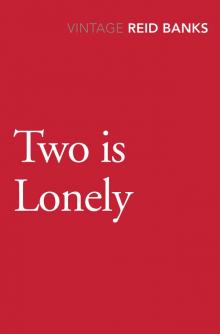 Two Is Lonely
Two Is Lonely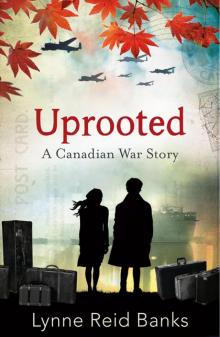 Uprooted - a Canadian War Story
Uprooted - a Canadian War Story The Backward Shadow
The Backward Shadow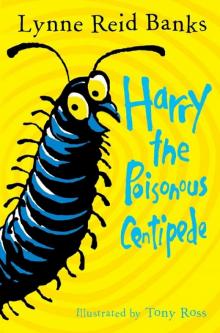 Harry the Poisonous Centipede: A Story to Make You Squirm
Harry the Poisonous Centipede: A Story to Make You Squirm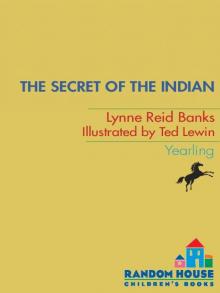 The Secret of the Indian (The Indian in the Cupboard)
The Secret of the Indian (The Indian in the Cupboard)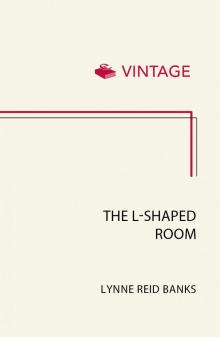 The L-Shaped Room
The L-Shaped Room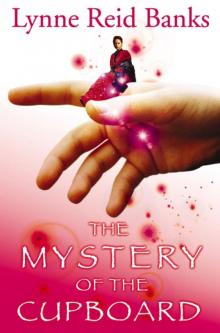 The Mystery of the Cupboard
The Mystery of the Cupboard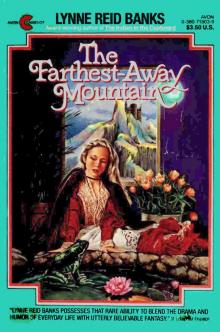 The Farthest-Away Mountain
The Farthest-Away Mountain Harry the Poisonous Centipede Goes to Sea
Harry the Poisonous Centipede Goes to Sea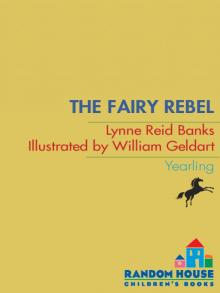 The Fairy Rebel
The Fairy Rebel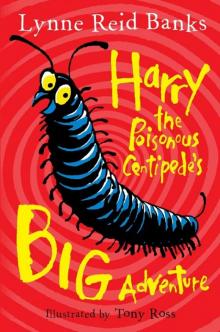 Harry the Poisonous Centipede's Big Adventure: Another Story to Make You Squirm
Harry the Poisonous Centipede's Big Adventure: Another Story to Make You Squirm The Indian in the Cupboard
The Indian in the Cupboard The Return of the Indian
The Return of the Indian I, Houdini
I, Houdini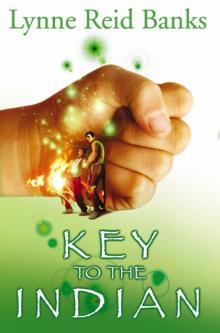 The Key to the Indian
The Key to the Indian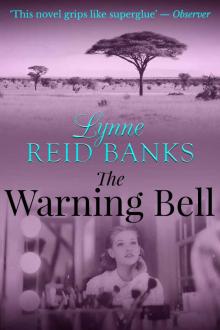 The Warning Bell
The Warning Bell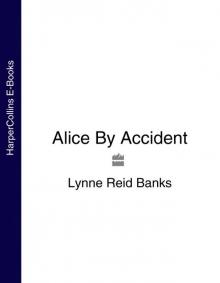 Alice by Accident
Alice by Accident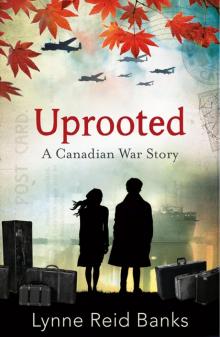 Uprooted
Uprooted Writing On the Wall
Writing On the Wall The Adventures of King Midas (Red Storybook)
The Adventures of King Midas (Red Storybook)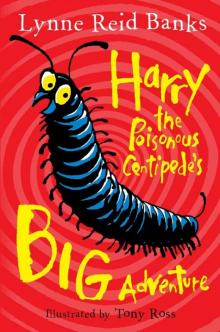 Harry the Poisonous Centipede's Big Adventure
Harry the Poisonous Centipede's Big Adventure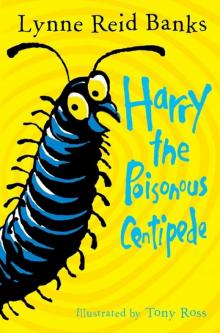 Harry the Poisonous Centipede
Harry the Poisonous Centipede The Dungeon
The Dungeon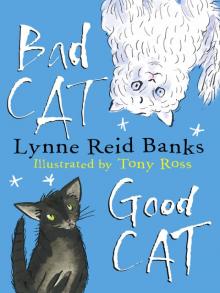 Bad Cat, Good Cat
Bad Cat, Good Cat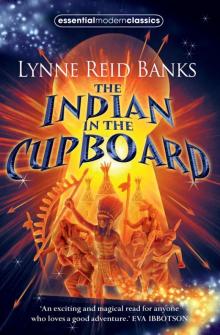 The Indian in the Cupboard (Essential Modern Classics, Book 1)
The Indian in the Cupboard (Essential Modern Classics, Book 1)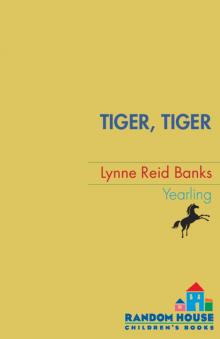 Tiger, Tiger
Tiger, Tiger